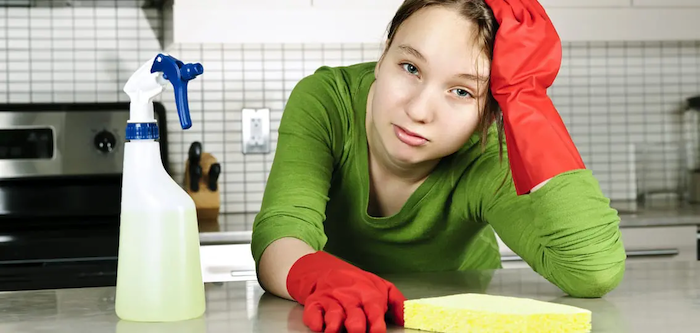Are you living with an Entitled teenager? Worried you have raised an entitled young adult? You aren’t alone, and there is hope (and help.)
Entitlement, in teenage terms, is when your kid thinks they’re entitled to privileges, goodies, and, let’s be honest, the wifi password without lifting a finger.
It’s a mindset that says, “Why should I make my bed when the universe should be doing it for me?” If throwing irrational tantrums were an Olympic sport, entitled teens would be gold medallists.
Living with an entitled teen or entitled young adult can be unpleasant and frustrating.
So, we have put together this ultimate guide on entitled teenagers (or entitled young adults if your teen has got older) to help parents find a way through and if possible avoid making things worse.
In this guide to entitled teenagers, we are going to cover:
- What are the Signs of Entitled Teenagers?
- Why Are Teenagers so Entitled?
- How to Deal with an Entitled Teenager?
What Are the Signs of an Entitled Teenager?
Teenage entitlement can present in various behaviours, and recognizing these signs of entitlement is an important first step for addressing the issue.

Here are some common (though not exhaustive) signs of teenage entitlement:
- Lack of Gratitude: Entitled teenagers often struggle to express gratitude for the things they receive or the efforts made on their behalf. They may take privileges, resources, or gestures of kindness for granted.
- Unrealistic Expectations: Entitled teens may harbor unrealistic expectations about what they deserve or should have. This can extend to material possessions, special treatment, or success without putting in the necessary effort.
- Resistance to Responsibility: Entitled teenagers may resist taking on responsibilities at home, school, or in other areas of their lives. They may expect others to handle tasks for them, contributing to a sense of dependency.
- Lack of Empathy: A sense of entitlement can lead to a diminished ability to empathize with others. Teens may struggle to understand or appreciate the perspectives and feelings of those around them.
- Tantrums or Outbursts: When faced with situations that challenge their sense of entitlement, teenagers may exhibit tantrums, anger, or emotional outbursts as a way to express frustration and demand compliance with their desires.
- Difficulty Handling Criticism: Entitled teenagers may have a hard time accepting criticism or feedback. They may react defensively, viewing any critique as a personal attack on their perceived entitlements.
- Sense of Superiority: Entitled teens may display a sense of superiority over their peers or even adults. They may believe they are inherently more deserving or special than others.
- Manipulative Behaviour: Entitled teenagers may use manipulation to get their way, whether through guilt-tripping, emotional manipulation, or other tactics to achieve their desired outcomes.
- Impatience: Entitled teens may struggle with patience and perseverance, expecting instant gratification and becoming frustrated when things do not go their way immediately.
- Disregard for Rules: A sense of entitlement can lead to a disregard for rules and boundaries. Teens may believe that rules shouldn’t apply to them or that they are exempt from consequences.
Why Are Teenagers So Entitled?
Admitting to yourself that you have raised an Entitled Teenager can be a blow to your parenting ego and general mental health.
But before you lock yourself in the bathroom with a stash of chocolate and a white flag, let’s acknowledge that entitlement is not a phenomenon unique to your home. It’s like a cold—almost everyone catches it at some point.
While it is easy to blame social media, celebrity culture, or the fact that they’ve never had to rewind a VHS tape manually, the reality is teenage entitlement is likely the outcome of large societal shifts. Factors such as a complex concoction of generational change, evolving cultural norms, changing trends in parenting styles, and the ever-growing emphasis on individualism in Western culture, have all contributed to the reality of increasingly entitled teens.
But just because it is everywhere, doesn’t mean you are helpless. Nor does it mean that your teenager needs to become an entitled young adult who is still not ready for adulthood at the age of 24!
Parents can reduce the likelihood and severity of their kids being completely consumed by the ever-present risk of entitlement, by taking some clear decisive steps.
Overindulgence
One significant root cause of teenage entitlement lies in the culture of overindulgence.
Imagine a scenario where parents consistently hand a teenager privileges and material possessions on a silver platter, creating an environment where the teenager’s desires are met without the need for effort.
Entitlement flourishes when parents are always providing the latest gadgets, fulfilling every request for transport or money without questioning, and shielding the teenager from the responsibilities that come with age.
When teens grow up in an atmosphere where everything is readily available, it fosters an expectation that the world should cater to their desires effortlessly. This continuous overindulgence can lead to a distorted perspective on the relationship between effort and reward, with entitlement becoming an unwelcome by-product.
Instant Gratification
In an era of instant noodles and on-demand everything, the prevalence of instant gratification has become another contributing factor to teenage entitlement. The ability to access information, entertainment, and goods with a click reinforces the expectation that everything should happen swiftly.
It is like the world has become one giant vending machine where you click a button, and voilà – your desires are delivered. From expecting immediate replies to messages to avoiding tasks that require more than a single click, the desire for instant results reduces a teenager’s grit and capacity for perseverance.
This inclination towards instant gratification fuels entitlement by reinforcing the belief that their desires should be met promptly, without the need for patience or perseverance.

Lack of Responsibility
Teenage entitlement often thrives in an environment where responsibilities are either absent or unevenly distributed.
When parent’s expectations for teens are lower than a limbo bar at a beach party, entitlement will develop. Low expectations of teens regarding household chores, shielding them from financial responsibilities, or limiting the requirements for genuine decision-making, are common examples of teen’s not having to manage responsibility.
When teenagers grow up without being held accountable for their actions or without experiencing the consequences of their choices, they may develop a skewed understanding of the relationship between effort and reward. Parents are essentially communicating to teenagers, “You’re the VIP guest; we’ll take care of the boring stuff.”
This lack of responsibility can extend beyond the household to school and social interactions, where entitled teenagers may expect privileges to be granted without the need to earn them through responsible behavior.
Comparison Culture
In the age of social media with filters and flawless Instagram feeds, teenagers find themselves immersed in a comparison culture that contributes significantly to the development of entitlement.
Platforms like Instagram, Snapchat, and TikTok showcase curated snapshots of seemingly perfect lives, creating an illusion that everyone else is living in a perpetual state of abundance and happiness.
Teenagers are naturally prone to comparison (and possibly a bit too many selfies,) and lack the maturity to critically evaluate what they see and distinguish it from a more nuanced reality. As a result, teens will readily internalize these images and develop a sense of entitlement based on the belief that they deserve a life as picture-perfect as the ones they see online.
This comparison culture can distort an adolescent’s perception of reality, leading to dissatisfaction and entitlement when their own lives don’t align with the filtered narratives presented on social media.

Parenting Styles
The parenting approach employed in the formative years plays a crucial role in shaping a teenager’s outlook on entitlement.
Overprotective parenting, where parents shield their teens from challenges, conflicts, and consequences, can inadvertently nurture entitlement.
Parents indulge their kids by constantly stepping in and solving their kids’ problems be they at school, with friends, with money, or avoiding consequences for their actions in general. In this environment, teenagers neither develop the necessary problem-solving skills, nor the resilience to work through difficult situations. It’s like they grow up with a GPS that only provides directions to the easy route, leaving the scenic detours of personal growth undiscovered.
On the flip side, a lack of consistent discipline and boundaries can also contribute to entitlement as teens may perceive a lack of accountability for their actions. When boundaries are more like faint blurry lines, and accountability involves the occasional headshake, teenagers don’t learn to respect or operate within limits.
Entitled teenagers often have parents who struggle to find a balance between providing support and allowing autonomy while instilling a sense of responsibility.

What to Do About an Entitled Teenager?
The rest of this article contains key issues and initiatives to consider turning around an entitled teen.’
But before you decide to go all gung-ho and implement a raft of changes all at once, or alternatively curl up in the corner sobbing due to the crushing overwhelm, just take a deep breath, pause, and take stock of where you are right now.
Change works best when it is implemented slowly and consistently, one step at a time.
You Need a Plan !
Instead of trying to make wholesale sweeping changes do the following:
-
- Nominate: Identify the actions that you think would be most effective in dealing with your teenager’s or young adult’s sense of entitlement.
- Prioritise: When you have nominated which actions or strategies you think need to be applied, then prioritise based on what needs to happen first, second, third, etc. (Hint: Responding Appropriately to your teen’s behaviour should always be near the top of the priority list – and it can be done in conjunction with another action.)
- Plan: Then focus on how you are going to implement the changes for the first priority. Think about; the best way to make the change, how your teen will likely respond, the best way you can mitigate the risks, what is your backup plan etc.
- Patience: Allow time for the changes to take effect – and remember things could well get worse before they get better – so that is why you want to take on small bite-size challenges one at a time.
- Don’t Give Up: Be prepared for some pushback and an increase in tantrums. Entitled teenagers can become very unhappy teenagers when their entitlements are threatened, and their comfy lifestyle disrupted. What is super important to remember when this happens is to STAY THE COURSE! Once your teen realises you are serious they will back off, but this might take a few rounds.
So with that in mind, let’s consider what are things you can do to correct your teenager’s sense of entitlement.
Respond Appropriately to Your Teens Behaviour
Choosing not to respond, or responding the wrong way, to teenage bad behaviour might seem like the path of least resistance. However, this approach contributes to and enables the development of entitlement.
When parents turn a blind eye to inappropriate conduct, they risk sending a message that there are no consequences for actions. It’s akin to letting a plant grow wild without pruning—it might look okay for a while, but eventually, it takes over the garden.
Similarly, without intervention, bad behaviour can become ingrained, and teenagers may come to expect that their actions carry no weight, fostering a sense of entitlement.
Don’t turn a blind eye if you know your teen is not behaving well. Wait for a calm moment and address the issue with them, calmly and firmly. By the way, “addressing the issue” includes outlining what the consequences are or will be next time.
Parents can also unintentionally contribute to entitlement behaviour by giving in or backing down whenever their entitled teen throws a tantrum, starts yelling, or threatens some sort of drastic behaviour when they don’t get what they want.
Entitled teenagers respond aggressively, become argumentative, or generally lose control when parents try to enforce limits, as a means of managing their parents through intimidation (and they may also lack some self-control). The entitled teen’s goal is to intimidate parents into thinking twice the next time they try to set an expectation to hold their teen accountable.

If you are in the habit of engaging with your upset teenager or persist in arguing with them, you are encouraging their sense of entitlement. They are trying to wear you down (and they will) so that soon you lower your expectations because you don’t want to deal with the consequence of your teen’s tantrum if you hold your ground.
The alternative? Walk away and don’t engage with them while they are being aggressive or argumentative. Choose to come back to them when they have calmed down.
The simple rules are – don’t let bad behaviour go unacknowledged, and don’t engage with an aggressive teen.
Set Clear Expectations
Setting expectations with teenagers is a crucial aspect of reducing your teen’s sense of entitlement.
Unlike younger children, teenagers are at a stage where they are developing a sense of autonomy and independence (you may have spotted this already.)
Clearly defining expectations provides a framework for understanding boundaries and responsibilities. It’s essential to engage in open and direct communication, discussing expectations for chores, academic responsibilities, and social activities. This straightforward approach ensures that parents make teenagers aware of what is expected of them and establishes a foundation for accountability.
When setting expectations with teenagers, it’s VITAL to involve them in the process. Rather than dictating rules from your parenting throne, consider having collaborative discussions to gather their input.
This not only demonstrates respect for their growing autonomy but also encourages a sense of ownership in adhering to the established expectations.
Involving teenagers in the decision-making process fosters a deeper understanding of the reasons behind certain limits (they have skin in the game,) making it more likely for them to willingly comply. By treating teenagers as active participants in the formation of household expectations, parents can promote a sense of responsibility and mutual respect.
Consistency is key to maintaining the effectiveness of set expectations. Teenagers, navigating the complexities of adolescence, benefit from clear and unwavering guidelines.
To this end, consequences for failure to uphold a responsibility or honour a boundary also form a vital part of setting expectations. Boundaries are only as strong as the parents follow through when teens step over the line.

If your teen comes home later than agreed, the consequence might be no weekend plans. Forgotten chores could mean spending quality time with the vacuum cleaner. The key is to establish a clear cause-and-effect relationship, much like the predictability of the sun rising each day.
Regularly revisiting and adjusting expectations based on evolving circumstances is also essential. This dynamic approach allows for ongoing communication and adaptation, ensuring that expectations remain relevant and realistic.
Overall, the process of setting expectations with teenagers serves as a foundational step in building a supportive and communicative family environment that facilitates their transition into adulthood and mitigates their becoming entitled young adults.
Let Your Teenagers Fail
Allowing teenagers to experience failure is a critical strategy in combatting entitlement and fostering resilience. Protecting your teen from the natural consequences of their actions inadvertently contributes to a sense of entitlement, as they may come to expect success without putting in the necessary effort.
Shielding them from failure is like trying to protect hot chips from seagulls at the beach—it might work for a bit, but eventually, those pesky lessons will swoop down and snatch it away. And on that occasion when your teen does encounter failure, and you aren’t able to help, your teenager will not have the skills or resilience to push through.
Allowing them to fail, however, provides a valuable lesson in accountability and the understanding that success often requires perseverance, learning from mistakes, and adapting strategies.

It is through facing the repercussions of failure that teenagers can develop a deeper appreciation for the correlation between effort and achievement, cultivate perseverance, and develop a work ethic that transcends entitlement.
Real-world scenarios rarely follow a linear path to success; you know common grown-up challenges like getting a job, finding a partner, finding somewhere to live, staying fit and healthy, those types of not straightforward real-life things.
Experiencing failure during adolescence equips teenagers with the resilience needed to confront setbacks later in life. It is through these experiences that they learn to view failure not as a defeat but as a stepping stone toward growth and self-improvement.
Ultimately, allowing teenagers to fail is an investment in their long-term well-being. It fosters a sense of self-reliance and accountability that is integral to their personal development. As they grapple with the consequences of their actions, teenagers learn valuable life lessons that extend beyond the immediate challenge, shaping their character and molding a mindset that values hard work, persistence, and a healthy understanding of success and failure.
Distinguishing Between Rights & Privileges
Teaching your teenager, the difference between rights and privileges is akin to providing them with a blueprint for responsible living and an anti-entitlement attitude. But first you as the parent need to be clear on the difference.
Rights are the fundamental aspects of their existence within the family unit. These encompass their right to shelter, food, safety, love, and support – the foundational elements that contribute to a nurturing and secure environment. In family discussions, parents should consider the foundational expectations that their teenager is entitled to, including the right to be heard and respected, and to be spoken to or treated in non-violent or harmful ways.
On the other hand, privileges are the additional benefits and opportunities that teenagers have access to or can earn based on their actions and fulfilling their obligations.
Access to a phone, electronic devices (and the free home Wi-Fi that goes with it), using a family car, being driven to and from events, or even extended curfew times can be seen as privileges. These are not guaranteed but are contingent on responsible behaviour, showing respect for established boundaries, and contributing positively to the family environment.
parents should teach their teenagers that privileges are not entitlements.
Importantly, parents should teach their teenagers that privileges are not entitlements. In other words, parents play a crucial role in conveying to their teenagers that many things taken for granted are actually privileges and can be revoked – all without violating basic human rights, a viewpoint that most entitled teenagers will passionately disagree with.
Insist on Contributions Around the House
I know, know, getting a teen to help is about as easy as folding a fitted sheet in a hurricane. However, encouraging teenagers to contribute to household responsibilities is a crucial strategy for mitigating entitlement and fostering a sense of responsibility.
As adolescents transition towards independence, actively involving them in household chores provides a tangible connection between their actions and the well-being of the family unit. This engagement serves as a practical lesson in accountability, teaching teens that their contributions directly impact the shared environment.
By participating in tasks such as cleaning, cooking, or maintaining shared spaces, teenagers develop a deeper appreciation for the efforts required to sustain a household, instilling a sense of responsibility that transcends personal entitlement. (And it also increases the chance of them finding a life partner and leaving home before they are 30!)
Moreover, involving teenagers in household responsibilities prepares them for the realities of adult life. Learning essential life skills, such as cooking, cleaning, and time management, becomes integral to their overall development. This proactive engagement also helps instil a work ethic and a recognition that success and comfort are often the results of collective effort rather than entitlement.
What are your teenager’s or young adults’ responsibilities at home?
What happens when your teenager fails to follow through or uphold their end of household tasks?
Teach Financial Responsibility
Teaching teenagers financial responsibility is a crucial life skill that equips them with the skills needed to navigate and appreciate personal finances. The awareness that managing money requires effort, choices, and discipline helps diminish entitlement and will potentially save you money in the long run.
Start by providing teens with a practical understanding of income, expenses, and savings. Making it very clear what expenses your teen is expected to cover and what things you are willing to pay for is an effective means of achieving this.
Encourage them to set financial goals, whether short-term or long-term, and develop a budget that aligns with those objectives. This process not only imparts a sense of financial discipline but also fosters an appreciation for planning and prioritizing spending.
Simple trade-offs such as reducing daily luxuries are sometimes necessary to achieve larger financial goals. Making coffee at home before going out teaches the art of appreciating simple pleasures without breaking the bank, fostering an understanding that fulfillment doesn’t always come with a hefty price tag. Meanwhile, two-minute- noodles, a staple in many college dorms, become a metaphor for resourcefulness and adaptability.

Create opportunities for your teenager to gain hands-on experience where they experience the direct relationship between effort and financial reward. Be it through completing chores for some or all their allowance, or getting a part-time job, exposing your teen to the real-world reality of how money works, and learning to appreciate its value, provides them with a much healthier set of expectations when it comes to money.
Teaching your teen that money does not grow on trees but is more likely to appear after working in a drive-thru or babysitting, is a sure-fire way to reduce entitlement.
Foster a Sense of Gratitude
Encouraging gratitude in teenagers serves as a powerful antidote to the toxic effects of entitlement, fostering a mindset that appreciates and values what they have. Teenagers and young adults with a sense of entitlement often struggle to value what others give them or recognize acts of kindness.
One effective approach to teaching gratitude to an entitled teenager is incorporating a daily gratitude practice into their routine. Encouraging them to keep a gratitude journal where they jot down a few things they are thankful for each day helps shift their focus from what they lack to what enriches their lives. If this seems as unlikely as winning an argument with a goat, you might let them know there is an app for that!

If that all still seems too much, try to get in the habit of asking regularly about something they are grateful for.
Modeling gratitude is equally vital. When parents express their own gratitude for simple pleasures or acknowledge the efforts of others, teenagers are more likely to adopt a similar perspective. Verbalizing appreciation for the small gestures, like a shared family meal or a helping hand from a friend, helps teenagers understand the value of recognizing and appreciating kindness.
Creating a family culture where expressions of gratitude are the norm establishes a foundation for humility and counters the entitled mindset that often accompanies adolescence.
Modeling Un-Entitled Behaviours
First and foremost, parents can showcase a work ethic that emphasizes the connection between effort and reward. By demonstrating a commitment to their own responsibilities, whether it’s managing household chores, pursuing a career, or engaging in community activities, parents provide a tangible example of the value of hard work.
This modeling helps counter the entitlement mindset, by proving that the remote control doesn’t come with a built-in entitlement button, sending a clear (if sometimes ignored) message that success in life requires a bit more effort than just mastering the art of Netflix binging.
Moreover, parents can exemplify humility and gratitude in their daily lives. Expressing appreciation for the efforts of others, acknowledging the role of external support in personal achievements, and demonstrating a willingness to learn from mistakes contribute to a well-rounded model of behaviour.

And don’t forget that your ability to laugh at yourself and life’s little mishaps also sends a clear message to your teen. By turning everyday scenarios into laugh-out-loud lessons, parents create a family culture where acknowledging mistakes is as normal as realizing you’ve been wearing your shirt inside out all day.
This relaxed approach helps teenagers see that life is more sitcom than melodrama and that humility and gratitude are the secret ingredients to a successful and entertaining storyline.
Next Steps with Your Entitled Teenager
Living with an entitled teenager or entitled young adult is hard. Admitting to yourself that you might have raised an entitled kid is sometimes just as hard.
But change starts by acknowledging and accepting where you are right now – even if that means acknowledging you are standing in a big pile of smelly stuff!
Hopefully, this article has helped you to see that entitled kids are a symptom of our age, and while your current situation may be unpleasant it doesn’t have to stay that way.
Consider what would be the best steps to take with your teenager (or young adult), prioritise, then focus all your energy on implementing the first few changes.
















